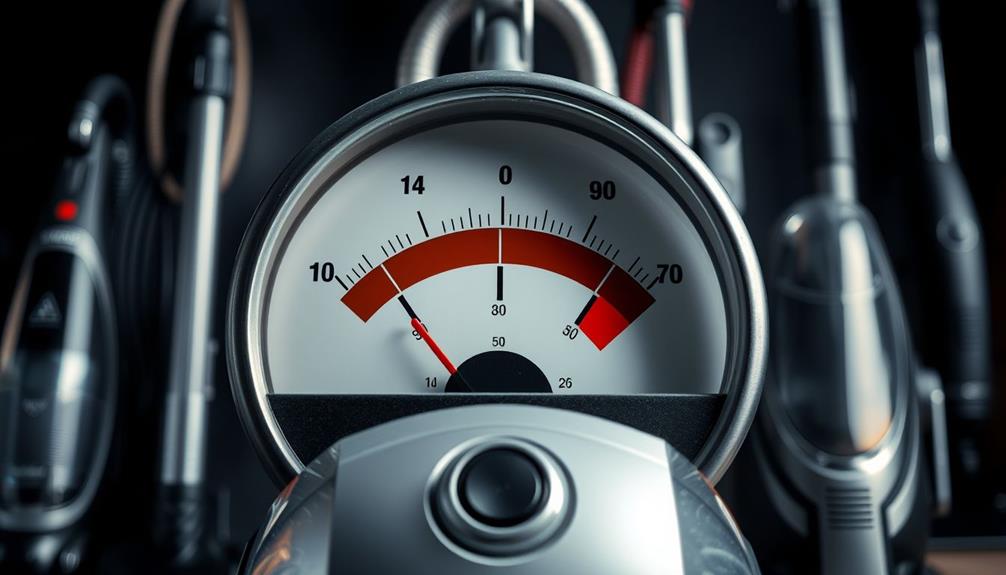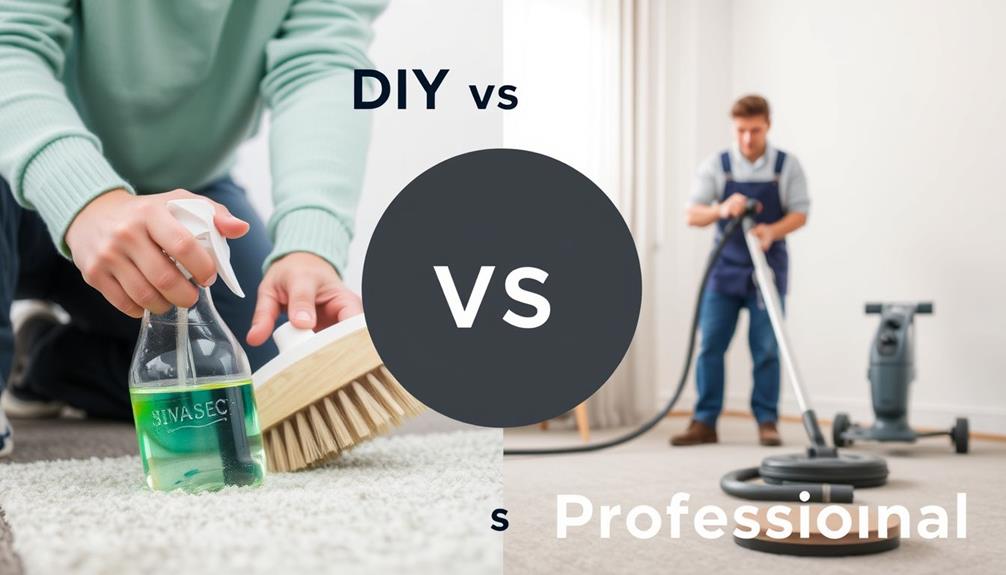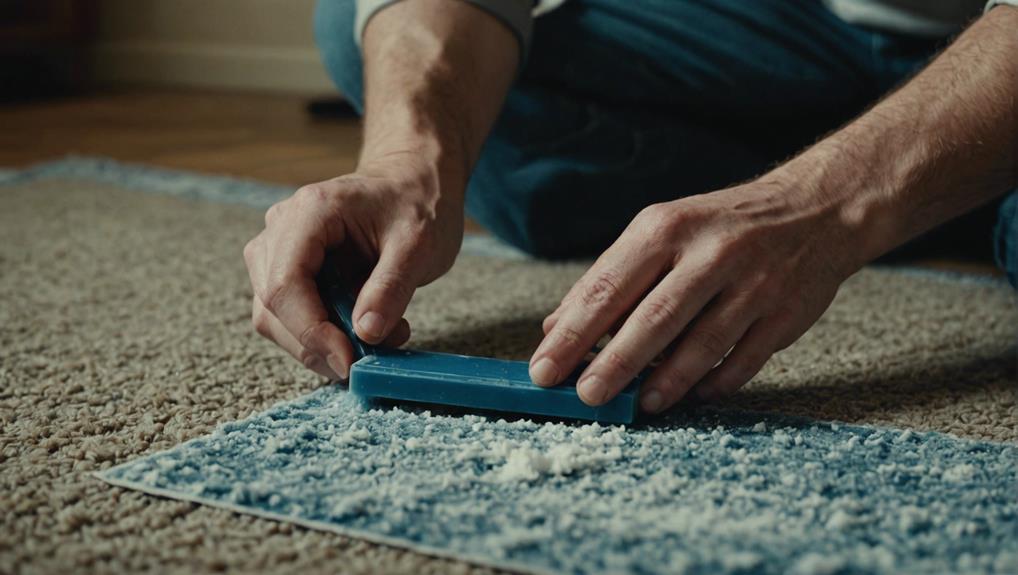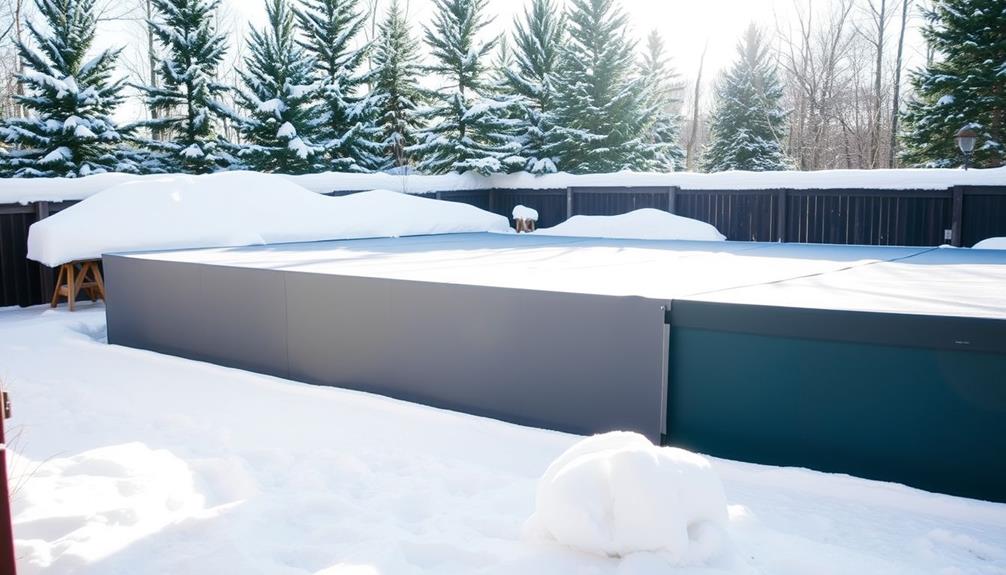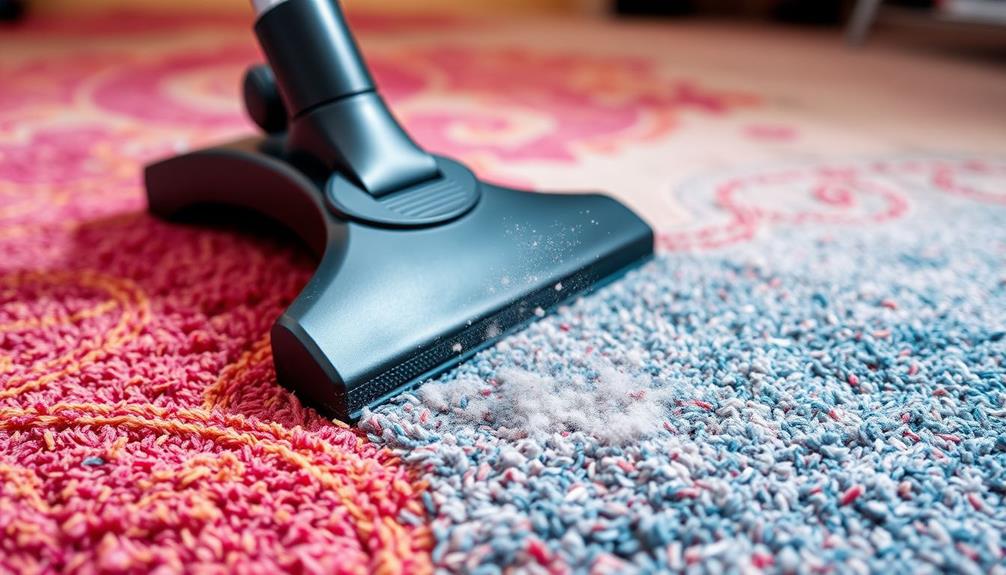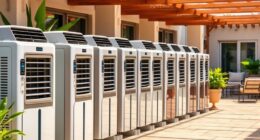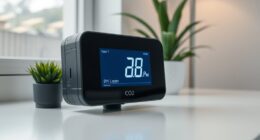Understanding **vacuum cleaner noise levels** is crucial for your comfort and safety. These machines usually operate between 60 and 80 decibels (dB). A whisper is about 30 dB, while **continuous exposure** to sounds above 85 dB can lead to **hearing loss**. Various vacuum types affect noise levels; for example, **upright models** are typically noisier than robots and canisters. Regular maintenance of your vacuum can help reduce noise levels and ensure it runs smoothly. By paying attention to these aspects, you can select a vacuum that suits your needs. There is a lot more to learn about making your cleaning routine quieter. Start exploring now to optimize your cleaning environment.
Key Takeaways
- Vacuum cleaners typically operate between 60 to 80 dB, with canister models being quieter than upright versions.
- Each 10 dB increase represents a tenfold increase in sound intensity, significantly impacting hearing health.
- Prolonged exposure above 85 dB can cause hearing damage, making quieter models preferable for regular use.
- Regular maintenance, such as cleaning filters, can help reduce a vacuum's noise levels and improve performance.
- Robot vacuums are generally the quietest option, operating between 55 to 70 dB, ideal for sensitive environments.
Understanding Decibels
Understanding sound intensity is vital when it comes to evaluating vacuum cleaner noise levels. Decibels (dB) measure sound intensity, and it's important to grasp how this scale works. Each increase of 10 dB represents a tenfold increase in intensity. For example, a whisper is around 30 dB, while a vacuum cleaner typically registers between 70 and 80 dB.
When considering options like the Bissell Pet Hair Eraser Vacuum, which is designed for effective hair removal, it's also important to take noise levels into account. You can tolerate sounds up to around 70-80 dB without discomfort, but prolonged exposure to levels above 85 dB can lead to hearing damage. This means that when you're using a vacuum cleaner, you should be aware of the potential risks.
A sound level of 120 dB can cause immediate hearing loss, so it's wise to be cautious. Using a decibel meter can help you monitor the noise levels of your vacuum cleaner to guarantee you're staying within safe limits.
Understanding these dB levels not only helps protect your hearing but also aids in evaluating the cleaning performance of your vacuum cleaner. By being informed about sound intensity, you can make better choices for both your health and cleaning needs.
Vacuum Cleaner Noise Levels

Vacuum cleaner noise levels vary widely depending on the type and model you choose. On average, vacuums produce noise levels ranging from 60 to 80 decibels (dB).
Canister vacuum cleaners tend to be quieter, operating between 60 to 70 dB, while upright and handheld models usually generate noise levels between 70 to 80 dB. If you're seeking a quiet vacuum, consider a robot vacuum, as they typically run at 55 to 70 dB, with models like ECOVACS even achieving around 65 dB.
For those with pets, finding a vacuum that balances performance and noise levels is crucial, especially since some top-rated vacuums specifically designed for tackling pet fur may also produce more sound.
Prolonged exposure to noise levels above 85 dB can pose a risk of hearing loss, so it's important to think about sound intensity when choosing your vacuum. A powerful motor often correlates with higher noise levels, but maintenance can help.
Keeping filters clean and ensuring the motor functions correctly can greatly reduce noise while you clean.
Factors Affecting Noise Levels

When choosing a vacuum, several factors can considerably influence its noise levels. The type of vacuum cleaner you select plays a significant role—upright and handheld models typically operate at 70-80 dB, while central and robot vacuums can be quieter, functioning at 55-70 dB.
Motor power is another critical factor; more powerful motors often generate higher noise levels, especially in upright models designed for heavy-duty cleaning. Additionally, maintaining good indoor air quality is important, as air purifiers reduce allergens and can complement a cleaner environment while you vacuum.
Maintenance is essential, too. A well-maintained vacuum with clean filters and unobstructed airflow runs more quietly than one with clogged filters or worn parts. The surface area you're cleaning also impacts noise intensity; vacuums tend to be noisier on carpets compared to hard floors.
If you're looking for a quieter experience, consider models with advanced noise-dampening technologies. Robot vacuums often incorporate improved motor designs and sound-insulating materials, which help minimize operational noise while still delivering effective suction power.
Choosing a Quiet Vacuum
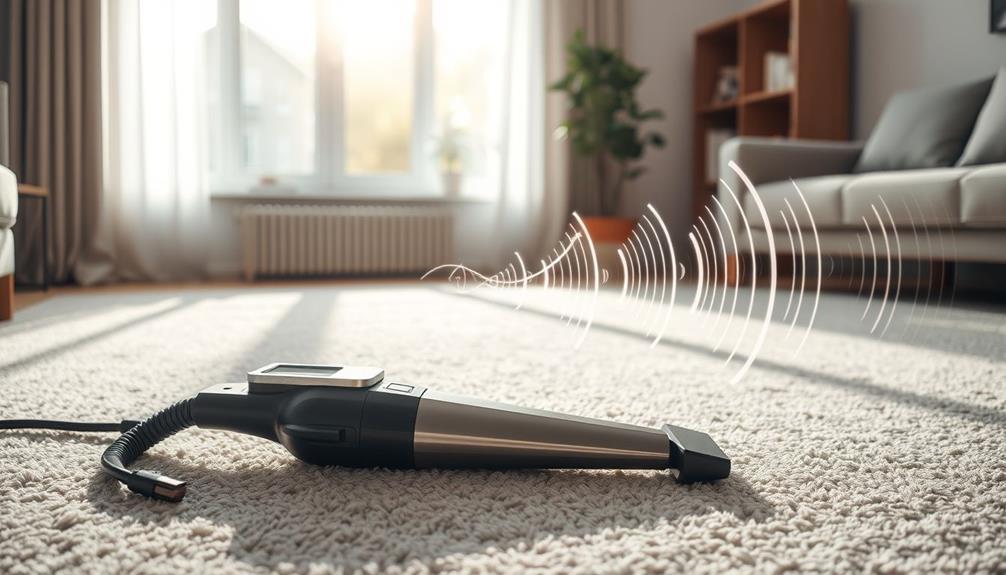
Many homeowners prioritize a quieter vacuum to create a more peaceful cleaning environment. When choosing a vacuum cleaner, aim for models that operate in the mid-60s dB range. These typically provide a comfortable noise level while still delivering effective cleaning performance.
If you're looking for an even quieter option, consider robot vacuums, which usually have noise levels between 55-70 dB. They make excellent choices for households with sensitive individuals. Additionally, maintaining a serene atmosphere can also be supported by the use of calming essential oils for relaxation, which can enhance your overall cleaning experience.
Look for features that help reduce noise, such as sound-insulating materials, soft rubber wheels, and adjustable suction settings. These can considerably lower the dB sound during operation.
Additionally, don't overlook the importance of regular maintenance. Keeping filters clean and checking for blockages can guarantee your vacuum runs quietly and efficiently over time.
While higher-quality, quieter vacuums may come with a steeper price tag, think of them as a long-term investment. A quiet vacuum can help minimize noise-related health issues like stress and sleep disturbances, ultimately enhancing your overall well-being.
Choosing the right vacuum can transform your cleaning experience into a more enjoyable and serene task.
Measuring Vacuum Noise Levels
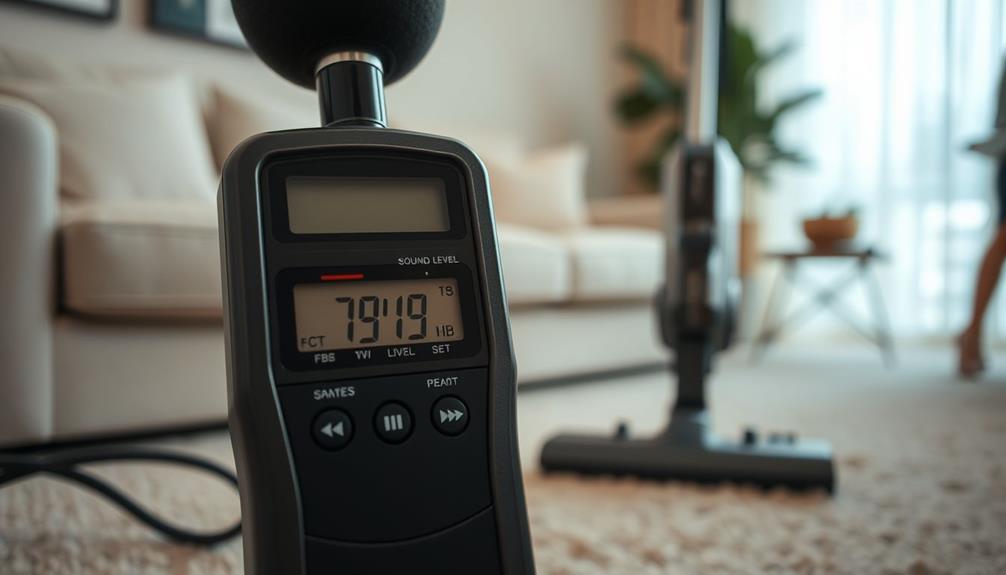
Noise levels for vacuum cleaners are typically measured in decibels (dB), providing a clear way to assess their sound intensity. Average models operate between 60-80 dB, depending on the type and brand. To measure the noise levels of your vacuum cleaner, you can use a decibel meter or even a smartphone app. This gives you an accurate assessment of the sound it produces during operation. If you have pets and are concerned about noise levels, consider investing in one of the top vacuums for pet hair, which are specifically designed to operate quietly. These models often have noise reduction features, such as insulated motors and sound-dampening materials, to keep the decibel levels lower. When shopping for a vacuum cleaner, make sure to check the product specifications for the noise level rating to ensure you find a model that suits your needs.
Implementing a methodical approach to maintenance can also contribute to quieter operation, ensuring that your vacuum cleaner remains effective and efficient. This is vital for enhancing customer satisfaction through reliable appliances, as outlined in the importance of quality assurance.
Robot vacuums are generally quieter than traditional models, producing noise levels between 60-70 dB. In contrast, upright cleaners can reach up to 80 dB, which may be noticeable during cleaning sessions. When shopping for a vacuum, check the product specifications to find detailed noise level information. This helps you compare different models and choose the quieter option that suits your needs.
Furthermore, regular maintenance of your vacuum cleaner plays a significant role in reducing operational noise levels. Tasks like cleaning filters and ensuring proper motor function can help keep your vacuum running quietly. This way, you can enjoy a cleaner home without the disruptive sounds often associated with vacuuming.
Frequently Asked Questions
What Is a Good Db for a Vacuum Cleaner?
A good dB level for a vacuum cleaner typically ranges from 55 to 75 dB.
If you prefer a quieter model, look for options like central or robot vacuums that operate at the lower end of this scale.
Traditional vacuums usually hit 70 to 80 dB, which can be moderately loud.
Aim for a model in the mid-60s dB for effective cleaning without overwhelming noise, ensuring a more comfortable experience while you clean.
What Does 70 Decibels Sound Like?
Imagine standing near a bustling café, where conversations blend with the clattering of dishes.
That's what 70 decibels sound like—it's that lively buzz. You'd notice it's loud enough to make you raise your voice just to be heard.
This level can feel intrusive, especially if you're trying to focus or chat. Prolonged exposure might leave your ears ringing, so keeping it in check is wise for your hearing's sake.
What Is 5000PA Suction?
When you hear "5000Pa suction," it means the vacuum can generate a strong pull to lift dirt and debris from surfaces.
This level of suction is effective for daily cleaning tasks on both carpets and hard floors.
If you're considering a vacuum, models with 5000Pa suction are typically mid-range to high-end, designed to tackle deep cleaning efficiently.
You'll notice improved performance and airflow, making your cleaning routine much easier.
What Does 40 Db Sound Like?
When you hear a sound at 40 dB, it's like being in a quiet library or enjoying a soft whisper.
You might notice it's considerably quieter than an average conversation, which is around 60 dB.
This level of sound feels calm and unobtrusive, making it perfect for focused work or study.
You won't experience discomfort or health concerns at this volume, allowing you to concentrate without distraction in serene environments.
Conclusion
In your quest for a quiet cleaning companion, remember that understanding decibel levels is key. By considering various factors and choosing wisely, you can greatly reduce the racket while vacuuming. Don't let noise dampen your daily duties; instead, seek a silent solution that suits your needs. With the right knowledge and careful selection, you can embrace a more peaceful cleaning experience, proving that silence truly is golden when it comes to your vacuum cleaner!
